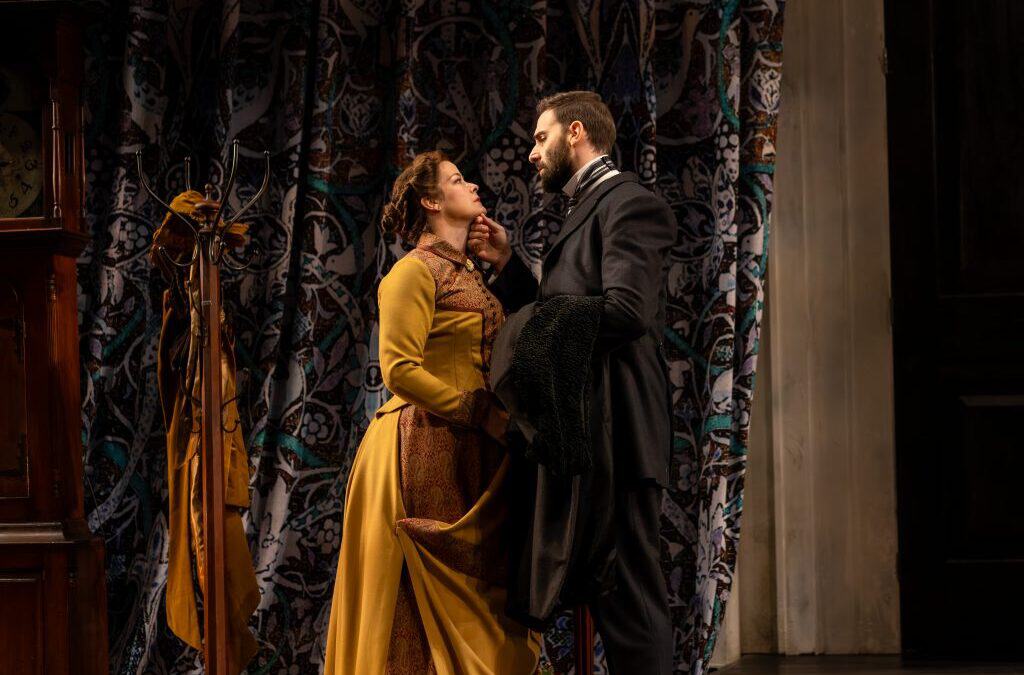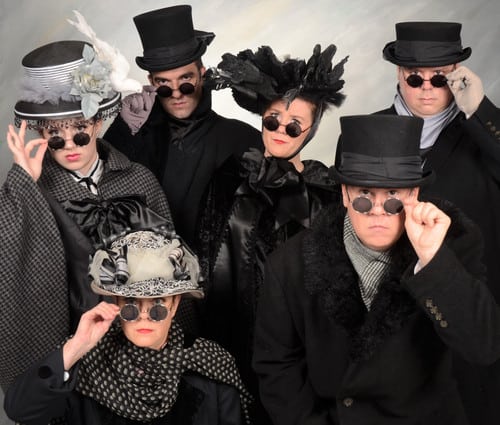“All of my writings address human desires and aspirations with a reverence for facts and principles.”
Not in Kansas Anymore: Tornado Tastes Like Aluminum Sting at CATF

Review: A Challenging DOLL’S HOUSE at Everyman Theatre
Review: A Challenging DOLL'S HOUSE at Everyman TheatreWith the current prominence of the Barbie movie, doll’s houses are much on the public mind. In the movie, the heroine’s maturity is partly expressed in her leaving her doll’s house and indeed the entire world that...

Chesapeake Shakespeare Company’s Pericles: Not a Serious Bone in its Body
by Jack L. B. Gohn Posted on BroadwayWorld.com Monday, July 5, 2021 I first attended an outdoor theatrical performance 64 years ago. Over the decades, there have been plenty more. Up until Saturday evening, I'd never once been rained out. Saturday, though, my string...

A Frosty but Comic Take on LOVE AND INFORMATION at Fells Point Corner Theatre
Churchill’s take on love and on information seems a bit chilly. There may be a lot of both love and information out there, she appears to intimate, but it’s not usually of very good quality. Much of Churchill’s frostiness is, however, presented with a comic touch, emphasized by Dierdre McAllister’s direction, by the energetic and youthful ensemble, and by the audience, which seemed to be goading on the performers with constant and frequently loud laughter.
A Sure-Footed BRIGHTON BEACH MEMOIRS at Vagabond Players
Neil Simon’s indecision about genre in Brighton Beach Memoirs was related to his problem being direct about his parents. A true account would necessarily have revealed their fighting, his father’s desertions and infidelities, and the eventual failure of their marriage, and could only have been presented as a tragedy or melodrama. A comedy (and Brighton Beach is formally a comedy) would need to present a sanitized version of what Simon remembered; it would satisfy his audience (which expected comedies) and his parents, but it would also come further from the flavor Simon wanted to present. What we get in consequence is a play in three somewhat inconsistent genres.
New Modes of Representation Forcing Reexamination of Oldtime Heroes: MEN ON BOATS at Baltimore Center Stage
Jaclyn Backhaus’s Men on Boats, now appearing at Baltimore Center Stage, is a gently amiable but persistently subversive take on America’s age of exploration. It recreates the 1869 expedition of John Wesley Powell and nine others down the Green and Colorado Rivers and into the Grand Canyon on a presidentially-ordained voyage of discovery. As the play is at pains to show us, the trip was a voyage of discovery only from the perspective of certain white Protestant men, since Native Americans lived along the route – and white Mormons dwelt close by as well. But only when the river and surrounding lands were surveyed and mapped by certain kinds of white men could they truly be considered part of the American imperium. While the travelers can acknowledge that various people “have run these streams” before them, including “natives” and military deserters, these predecessors were persons whom “no one counts.” That laughably foreshortened perspective does not rob the travelers of bravery, resilience, or grit. It just makes their heroic sacrifices less consequential than they understand.

Forbidden Love and Royalty: Dueling Themes in E2 at REP Stage
Clearly, the story of a king who would, legally speaking, seem like the safest person in the land, but who nonetheless is slain, as is his lover, because their relationship is considered taboo, seems facially like a perfect vehicle to provide that treatment. But it simply isn’t, or at least not without more work. There are too many complications unique to a royal situation, as this play cannot help showing.

August Wilson Ending on a High Note: RADIO GOLF at Everyman
And thus the struggle over ways of thinking and dealing commences. For Hicks, the past that Sterling and Barlow are protecting has no value, and the validity of Barlow’s legal claim is irrelevant. From his standpoint, when the powers that be have firmed up their plans to a certain point, mere legality must step aside. For Wilks, abandoning the rule of law leads to chaos, even if following that principle leads to results that disappoint the oligarchs. I’ll leave it to audiences to discover how the clash of perspectives works out, but it is clear that, regardless of what becomes of Aunt Ester’s home, Wilks’ choice to adhere to the rule of law and to honor his roots and ancestors would destroy his great plans, his business partnership, and probably his marriage. Though, of course, regardless of the outcome, such a choice would also make him a hero.

An Old But Surprisingly Modern Comic Treasure: THE KNIGHT OF THE BURNING PESTLE at Baltimore Shakespeare Factory
The Knight of the Burning Pestle is rarely produced, and it certainly deserves the occasional outing, if only as a reminder that our forbears were just as interested in trying experiments with theatrical genre and form as we are.

Cold-Hearted But Great Fun: A GENTLEMAN’S GUIDE TO LOVE AND MURDER at Dundalk Community Theatre
Getting Americans in a frame of mind where they’ll despise British aristocrats is like shooting fish in a barrel (unless they’re Americans who happen to be still in a daze from a viewing of Downton Abbey). And here the setup provides all the inducement we Yanks need to salivate for Limey blue blood: a highborn family, the D’Ysquiths, disowning a daughter because she eloped with a lowborn foreigner, and (most of them) behaving in impeccably beastly ways towards her son Monty.

 I lived in London and Vienna before coming to the United States, and grew up mainly in Ann Arbor. I was writing plays and stories as early as grade school. My undergraduate years at the University of Pennsylvania, where I first reviewed theater, for the college paper, were succeeded by graduate study at the Johns Hopkins University, where I earned a doctorate in English Literature.
I lived in London and Vienna before coming to the United States, and grew up mainly in Ann Arbor. I was writing plays and stories as early as grade school. My undergraduate years at the University of Pennsylvania, where I first reviewed theater, for the college paper, were succeeded by graduate study at the Johns Hopkins University, where I earned a doctorate in English Literature.